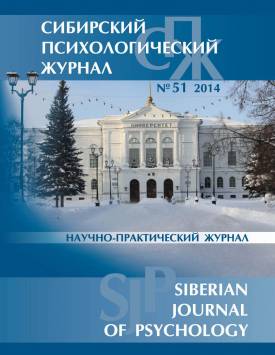Spontaneity as a general idea
The article presents an analytical review of the interpretation of the concept of «spontaneity», based on who gives his psychological basis. Now the problem of comprehension of the concept of spontaneity in the psychology makes special meaning as there is a danger of the vulgarization of the concept or the suppression of its demonstration through the introduction of a concise pale of normative behaviour. The interpretation of this concept in the conception of individual, analytical, existential, humanistic psychology is given by the author. In the provisions of the individual psychology principle of spontaneous activity is justified as the realization of priority «future over the past», free conscious activity, creativity «I», which defines the purpose and lifestyle. Representatives of neofreydizm determine spontaneity as a basic condition of feeling himself as the subject of activity, the condition to their abilities. According to the scientist, the concept of spontaneity closely connects to freedom. Carl Jung treats spontaneity as «value intensities» or psychic energy, which is the basis of the creative process, which is characterized by spontaneous interaction with overindividual forces, organizes the development of vital energy, the ability to independently cope with the problem task. F. Perzl argues that spontaneity causes adequate reaction to changing situations. According to the scientist, a spontaneous perception has important value in the changing situation which contributes development of a sense of urgency. Representatives of existential psychology argue that the spontaneity of our existence is based on the development of ability to listen to your inner feelings and to open to the world. The concept of spontaneity is justified as opportunity to express yourself, freedom, self-determination. The concept of spontaneity is primarily due to the dual mode when «I» and «You» is combined into «We». Strong position in the conception of spontaneity is the study humanistic psychologists. A. Maslow argues that self-actualizing people are prone to spontaneous behaviour, which is characterized by simplicity and naturalness. An adequate perception of reality, the possibility of manifestation of one's own uniqueness depend on spontaneity. Generalizing psychologists approaches to this concept, the author makes the conclusion that spontaneity can be defined as natural, freedom of forthcoming action, independent choice, condition of notional regulation of behaviour.
Keywords
спонтанность, позитивный потенциал, естественность, субъектность, выбор, изменение ситуации, spontaneity, positive potential, naturalness, subjectivity, choice, change of the situationAuthors
| Name | Organization | |
| Orekhova Nina V. | Zabaikalskiy State University (Chita) | nina.orehova@bk.ru |
References

Spontaneity as a general idea | Sibirskiy Psikhologicheskiy Zhurnal – Siberian Journal of Psychology. 2014. № 51.
